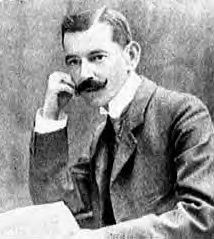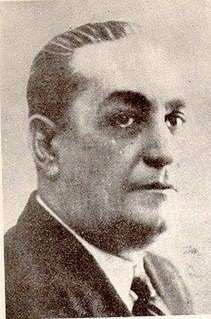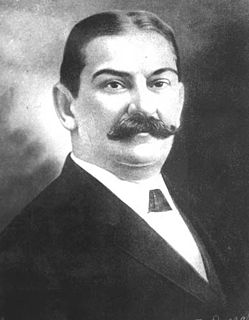 W
WJack Agüeros was an American community activist, poet, writer, and translator, and the former director of El Museo del Barrio.
 W
WJosé S. Alegría, was a poet, writer, lawyer and politician. Alegría was a founding member of the Puerto Rican Nationalist Party and president of the political organization from 1928 to 1930.
 W
WDr. Manuel Antonio Alonso Pacheco was a writer, poet and journalist. He is considered to be the first Puerto Rican writer of notable importance.
 W
WFrancisco Arriví, a.k.a. Paco, was a writer, poet and playwright known as "The Father of the Puerto Rican Theater."
Nemesio Canales was a Puerto Rican essayist, journalist, novelist, playwright, politician and activist who defended women's civil rights. As a politician, he presented a bill to the Puerto Rico House of Representatives, which was defeated 23 votes to 7, giving women their full civil rights, including the right to vote.
 W
WManuel Corchado y Juarbe was a Puerto Rican poet, journalist and politician who defended the abolition of slavery and the establishment of a university in Puerto Rico. Through his written works he criticized the way the people of Puerto Rico were being treated by the island's Spanish-appointed governor.
 W
WJuan Antonio Corretjer was a Puerto Rican poet, journalist and pro-independence political activist opposing United States rule in Puerto Rico.
Dr. José Antonio Dávila was a postmodern Puerto Rican poet.
 W
WJosé de Diego, was a statesman, journalist, poet, lawyer, and advocate for Puerto Rico's independence from Spain and from the United States who was referred to by his peers as "The Father of the Puerto Rican Independence Movement"
 W
WMartín Espada is a Latino poet, and professor at the University of Massachusetts Amherst, where he teaches poetry. Puerto Rico has frequently been featured as a theme in his poems.
 W
WManuel Fernández Juncos was a Spanish-born, Puerto Rican journalist, poet, author and humanitarian who wrote the official lyrics to La Borinqueña, Puerto Rico's official anthem.
 W
WSotero Figueroa Hernández was born in Ponce, Puerto Rico, in 1851. He studied at the school of Rafael Cordero in San Juan, and was later known for his work as a journalist, dramatist, speaker and author of biographical essays. He was also a loyal defender of Puerto Rican and Cuban independence. Figueroa died and was buried in Cuba in 1923.
 W
WJaime "Shaggy" Flores is a Nuyorican poet, writer and African Diaspora scholar who forms part of the Nuyorical literary movement.
 W
WJosé Martín Antonio Gautier Benítez was a Puerto Rican poet of the Romantic Era.
 W
WCésar Andreu Iglesias was a Puerto Rican political activist, labor organizer, journalist, novelist, and short story writer.
 W
WLawrence La Fountain-Stokes is a gay Puerto Rican author, scholar, and performer. He is better known as Larry La Fountain. He has received several awards for his creative writing and scholarship as well as for his work with Latino and lesbian, gay, bisexual, and transgender (LGBT) students. He currently resides in Ann Arbor, Michigan.
 W
WEnrique Arturo Laguerre Vélez was a teacher, novelist, playwright, critic, and newspaper columnist from Moca, Puerto Rico. He is the author of the 1935 novel La Llamarada, which has been for many years obligatory reading in many literature courses in Puerto Rico.
 W
WJesús Abraham "Tato" Laviera was a Latino poet and playwright in the United States. Born Jesús Laviera Sanches, in Santurce, Puerto Rico, he moved to New York City at the age of ten, with his family, to reside in the Lower East Side. Throughout his life he was involved in various human rights organizations, but was best known as a renowned Nuyorican poet. An obituary for NBC Latino describes him as "one of the greatest representatives of the Nuyorican movement."
 W
WLuis Llorens Torres, was a Puerto Rican poet, playwright, and politician. He was an advocate for the independence of Puerto Rico.
 W
WÁngel Luis Lozada Novalés is a Puerto Rican novelist, activist, educator and scholar.
 W
WHugo Margenat, was a Puerto Rican poet and Puerto Rican Independence advocate. His art was committed to serving a militant nationalistic agenda. He was the founder of the political youth pro-independence organizations "Acción Juventud Independentista" and the "Federación de Universitarios Pro Independencia".
 W
WRené Marqués was a Puerto Rican short story writer and playwright.
 W
WFrancisco Matos Paoli March 9, 1915 – July 10, 2000), was a Puerto Rican poet, critic, and essayist who in 1977 was nominated for the Nobel Prize in Literature. His books were rooted in three major literary movements in Latin America: Romanticism, Modernism, and Postmodernism.
 W
WLuis Muñoz Rivera was a Puerto Rican poet, journalist and politician. He was a major figure in the struggle for political autonomy of Puerto Rico.
 W
WDr. José Gualberto Padilla, also known as El Caribe, was a physician, poet, journalist, politician, and advocate for Puerto Rico's independence. He suffered imprisonment and constant persecution by the Spanish Crown in Puerto Rico because his patriotic verses, social criticism and political ideals were considered a threat to Spanish Colonial rule of the island.
Luis Palés Matos was a Puerto Rican poet who is credited with creating the poetry genre known as Afro-Antillano. He is also credited with writing the screenplay for the "Romance Tropical", the first Puerto Rican film with sound.
 W
WBenito Pastoriza Iyodo is an author of poetry, poetics, fiction and literary articles. The themes of his literary works include: man's evolution from childhood to adulthood, examination of self, the precipices of culture and its rituals, violence in the cities, examination of stereotypes, the constructs of communication, gender roles and sexuality, education systems and racism, exploitation and the manifestation of exclusion through political and economic powers.
 W
WPedro Pietri was a Nuyorican poet and playwright and one of the co-founders of the Nuyorican Movement. He was considered by some as the poet laureate of the Nuyorican Movement.
 W
WMiguel Piñero was a playwright, actor and co-founder of the Nuyorican Poets Café. He was a leading member of the Nuyorican literary movement.
 W
WSamuel Ramón Quiñones Quiñones commonly known as Samuel R. Quiñones was a prominent attorney in Puerto Rico who served as Speaker of the House of Representatives of Puerto Rico from 1941 to 1943 and for twenty years in the Senate of Puerto Rico as its fifth President, from 1949 to 1968, by far the longest serving Senate President. He is also the only person two hold both posts.
 W
WManuel Ramos Otero was a Puerto Rican writer. He is widely considered to be the most important openly gay twentieth-century Puerto Rican writer who wrote in Spanish, and his work was often controversial due to its sexual and political content. Ramos Otero died in San Juan, Puerto Rico, due to complications from AIDS.
 W
WEvaristo Ribera Chevremont is a poet from Puerto Rico. Although several of his published books deal with Puerto Rican nationality and regionalism, many of his verses excel in a universal lyrical character, as can be read in books such as El Caos de Los Sueños and El Hondero Lanzó la Piedra, among others.
 W
WJosé Rivera is a playwright and the first Puerto Rican screenwriter to be nominated for an Oscar.
 W
WFather Francisco Ayerra de Santa María (1630–1708) is considered to be Puerto Rico's first native born poet.
 W
WClemente Soto Vélez was a Puerto Rican nationalist, poet, journalist and activist who mentored many generations of artists in Puerto Rico and New York City. Upon his death in 1993, he left a rich legacy that contributed to the cultural, social and economic life of Puerto Ricans in New York and Latinos everywhere.
 W
WAlejandro Tapia y Rivera was a Puerto Rican poet, playwright, essayist and writer. Tapia is considered to be the father of Puerto Rican literature and as the person who has contributed the most to the cultural advancement of Puerto Rico's literature. In addition to his writing, he was also an abolitionist and a women's rights advocate.
 W
WJustin Torres is an American novelist and an Assistant Professor of English at University of California, Los Angeles. He won the First Novelist Award for his semi-autobiographical novel We the Animals which was also a Publishing Triangle Award finalist and a NAACP Image Award nominee. We the Animals has been adapted into a film and awarded the Next Innovator Prize at the Sundance Film Festival.
 W
WJosé Luis Vega is a Puerto Rican poet.
 W
WWilliam Carlos Williams was a Puerto Rican-American poet, writer, and physician closely associated with modernism and imagism.
 W
WManuel Zeno Gandía was a Puerto Rican physician, poet, novelist, journalist and politician. He is best known as the author of La Charca, a novel considered by many to be the first Puerto Rican novel.